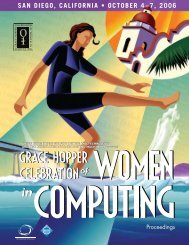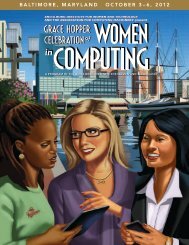ABI-ONE ghc program v14.indd - Grace Hopper Celebration of ...
ABI-ONE ghc program v14.indd - Grace Hopper Celebration of ...
ABI-ONE ghc program v14.indd - Grace Hopper Celebration of ...
Create successful ePaper yourself
Turn your PDF publications into a flip-book with our unique Google optimized e-Paper software.
GENERAL POSTER SESSION<br />
W e d n e s d ay | s e p T 3 0<br />
algorithms for learning MLNs can only deal<br />
with small datasets with few descriptive<br />
attributes. Non-binary descriptive attributes<br />
dramatically increase the search space <strong>of</strong><br />
possible candidate clauses. We propose and<br />
implement an innovative Joint-Bayesian-<br />
Network (JBN) algorithm for learning a<br />
directed relational model, and JBN performs<br />
much better in runtime and predication than<br />
other benchmark algorithms.<br />
Student Organized Workshops:<br />
Experiences From The Women in<br />
Machine Learning Workshop<br />
Presenter: Inmar Givoni (University <strong>of</strong><br />
Toronto)<br />
Topic-specific workshops that bring<br />
together students and researchers<br />
from across the globe are a great way to<br />
build supportive communities for women<br />
in computing. Such events can be found<br />
and organized by graduate students even<br />
when they are geographically apart. This is<br />
a case-study <strong>of</strong> my experiences from organizing<br />
such a workshop. I hope describing<br />
the positive impact <strong>of</strong> the workshop would<br />
potentially motivate other graduate students<br />
to take similar action.<br />
Surprise Recognition and Reasoning<br />
with the Help <strong>of</strong> Distributed Game<br />
Players<br />
Presenter: Xiaoxi Xu (University <strong>of</strong><br />
Massachusetts, Amherst)<br />
Given that change is ubiquitous, it is<br />
necessary for many <strong>of</strong> our systems to<br />
recognize surprising and provocative events<br />
and learn from them. In this project, we are<br />
concerned with how to recognize surprising<br />
events and reason about subsequent similar<br />
events. We proposed two interactive online<br />
games that entice distributed players to<br />
help solve concerned problems in a way<br />
not possible by either humans or computers<br />
alone.<br />
Sustainable Multi-Robot Patrol <strong>of</strong> an<br />
Open Polyline<br />
Presenter: Elizabeth A Jensen (University<br />
<strong>of</strong> Minnesota)<br />
In multi-robot patrol, a team <strong>of</strong> robots<br />
works to optimize the frequency with<br />
which they cover a set <strong>of</strong> points. While<br />
previous work has focused on the uniformity<br />
<strong>of</strong> the patrol algorithm, we focus on the<br />
longevity <strong>of</strong> the system. We present an<br />
algorithm that maintains coverage <strong>of</strong> an<br />
open polyline using simple robots that have<br />
limited battery lives. We present results<br />
obtained through both physical experiments<br />
and simulations.<br />
Teaching Across Boundaries: Classes<br />
in the Online Environment<br />
Presenter: Antoinette Davis (University <strong>of</strong><br />
Kentucky)<br />
Online education provides an excellent<br />
opportunity for teachers and students<br />
to collaborate in the digital environment,<br />
across geographical boundaries. This<br />
poster highlights the challenges faced in<br />
online classrooms, especially in the STEM<br />
disciplines. It also presents various strategies<br />
and technologies that can make online<br />
courses more engaging and student-friendly.<br />
The authors hope this poster will serve to<br />
engender discussions and collaborations<br />
among the community <strong>of</strong> online educators<br />
at GHC.<br />
Teaching Girls Programming: The<br />
Intentional Method<br />
Presenter: Kenny Spade (Micros<strong>of</strong>t)<br />
Learn to engage first year <strong>program</strong>ming<br />
students using free courseware<br />
developed via a new teaching method.<br />
Llewellyn Falco and Lynn Langit, pr<strong>of</strong>essional<br />
<strong>program</strong>mers, have created and<br />
tested a set <strong>of</strong> reusable, gender-neutral<br />
courseware. Using their intentional teaching<br />
method (based on the best <strong>of</strong> Agile practices<br />
and more), they have successfully started<br />
hundreds <strong>of</strong> kids <strong>program</strong>ming. Stop by their<br />
poster session to try out the courseware live<br />
at GHC.<br />
Technology and Persuading Teenagers’<br />
Physical Activity<br />
Presenter: Sonia M. Arteaga (University <strong>of</strong><br />
California, Santa Cruz)<br />
Obesity trends in youth have been on the<br />
rise resulting in an increased risk <strong>of</strong><br />
health problems, such as TypeII Diabetes.<br />
Not only is obesity detrimental to one’s<br />
health, but it also puts increased pressure<br />
on health care and medical expenses. This<br />
project investigates the use <strong>of</strong> persuasive<br />
technologies to motivate teenagers to<br />
become and continue being physically<br />
active. Design guidelines for this user group<br />
and lessons learned are discussed.<br />
The 1st Database for Experimentally<br />
Discovered microRNA Pr<strong>of</strong>iles in<br />
Human Cancers and Integrated Tools<br />
for microRNA Sequence Analysis<br />
Presenter: Boya Xie (East Carolina<br />
University)<br />
We developed a tool called miRSAT<br />
with a database called miRCDB for<br />
microRNA sequence analysis and cancerrelated<br />
research. The miRSAT aims to<br />
provide computational sequence analysis<br />
for microRNAs <strong>of</strong> both animals and plants to<br />
help researchers discover possible relationships,<br />
functionalities, and evolutionary<br />
histories <strong>of</strong> microRNAs. On the other hand,<br />
miRCDB is the first database that stores<br />
detailed miRNA experimental expression<br />
pr<strong>of</strong>iles in human cancers.<br />
The Amblr: A New Way to Explore a<br />
Music Collection<br />
Presenter: Rebecca L. Stewart (University<br />
<strong>of</strong> London, Queen Mary)<br />
Browsing music usually means searching<br />
through artist/album/track listings,<br />
but relying on these textual descriptions<br />
<strong>of</strong> music can be limiting. A music browser<br />
that does not rely on reading, but instead on<br />
listening is proposed. This poster presents<br />
Anita Borg Institute for Women and Technology | <strong>Grace</strong> <strong>Hopper</strong> <strong>Celebration</strong> <strong>of</strong> Women in Computing 61




